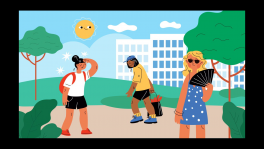Sri Lanka simmers day after clashes: EU condemns ‘vicious attacks’ on civilians, IMF talks at risk
EU urges restraint a day after violence in the nation leaves eight dead; US, China say they are watching developments closely

The European Union on Tuesday condemned the "vicious attack" on civilians in Sri Lanka that sparked deadly rioting on the island, as China said it was "closely following" the events in the country.
"The European Union (EU) and its 27 Member States are monitoring closely developments in Sri Lanka. The EU condemns the recent vicious attack against peaceful protestors in Colombo, which triggered further violence after a month of peaceful demonstrations," the bloc said in a statement.
The European bloc called on the Sri Lankan authorities "to initiate an investigation into the events and to hold accountable those instigating or perpetrating violence. The EU urges all parties to refrain from violence and to show restraint."
The South Asian nation is experiencing an unprecedented economic collapse that has pushed the government into a deep crisis. The island is struggling to import basic necessities for its 22 million people because of diminishing foreign reserves and crippling debt, spurring weeks of anti-government protests that turned violent and led to the Mahinda Rajapaksa's resignation on Monday. Eight people died and over 200 were injured.
President Gotabaya Rajapaksa, the former prime minister's younger brother, urged for an end to the violence and his government outlined broad powers for the military and police to detain and question people without arrest warrants.
"All efforts will be made to restore political stability through consensus, within constitutional mandate & to resolve economic crisis," he said in a tweet.
The country's defence ministry also ordered troops to shoot at any persons damaging public property or threatening lives. But protesters continued rallying for the president to quit, including at the "Gota Go Gama" tent village that was attacked by ruling party supporters on Tuesday.
"Now the whole island is supporting us," said Lahiru Fernando, 36, who has been camped at the anti-government protest site for weeks. "They kicked the wrong generation."
China on Tuesday said it is "closely following" the violent turn of events in Sri Lanka, where it has substantial investments, and asked the Chinese nationals working in the island nation to be alert and on guard against risks.
"The bloodshed and conflict took place in Sri Lanka's capital Colombo and other places, causing relatively large casualties," China's Foreign Ministry spokesman Zhao Lijian told a media briefing on Tuesday.
The US on Monday said that it is monitoring the situation in Sri Lanka after the protestors burned the houses of ministers.
"Closely monitoring the situation in Sri Lanka. We are deeply concerned by the violence against peaceful protesters and innocent bystanders, and are urging all Sri Lankans to focus on finding and enabling long-term solutions to the country's economic and political challenges," tweeted US state department bureau of South and Central Asian affairs.
Some experts said that if the president decides to step down in the face of growing pressure, the constitution outlines provisions for parliament to vote in a new leader.
"So, there will not be a power vacuum. There are also provisions for parliamentarians to appoint an interim government," said Bhavani Fonseka, a senior researcher at the Centre for Policy Alternatives think tank.
IMF talks at risk
Sri Lanka faces complications and delays in bailout talks with the International Monetary Fund amid questions over political stability after the prime minister resigned, Citigroup Global Markets said.
The resulting economic contraction and widespread hardship "would raise questions about the stability of the current political establishment and its ability both to negotiate an IMF program as well as implement a tough economic program," Citigroup analysts led by Johanna Chua wrote in a note to clients.


 Keep updated, follow The Business Standard's Google news channel
Keep updated, follow The Business Standard's Google news channel
















